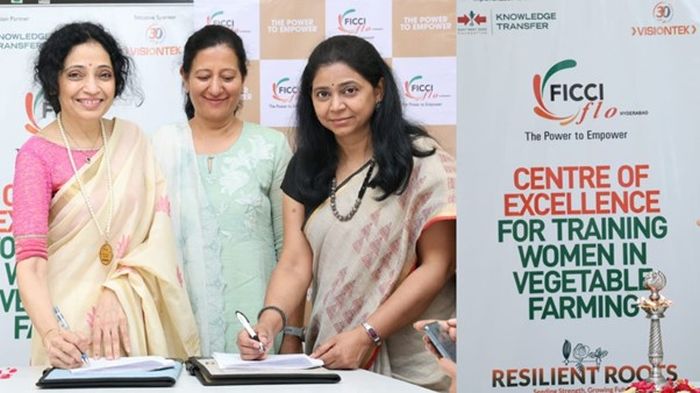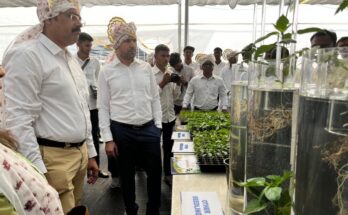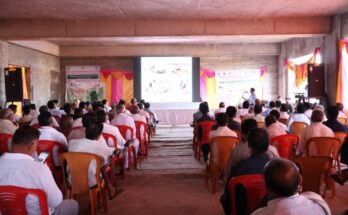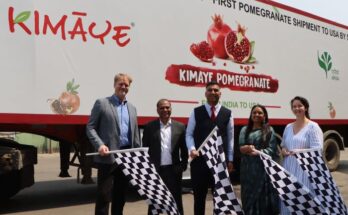Hyderabad: The Hyderabad chapter of FICCI Ladies Organization (FLO) launched the ‘Centre of Excellence for Training Women in Vegetable Farming’ at Ravalkole village, Medchal district. In collaboration with the East-West Seed Knowledge Transfer Foundation, FLO Hyderabad signed an MoU to train 100 women farmers in commercial vegetable farming. These farmers will receive comprehensive training in cultivating, managing, and harvesting nearly 50 hybrid varieties of vegetables and greens.
Over the next three crop seasons, the FLO Hyderabad Center of Excellence will educate 100 women in efficient, profitable, and sustainable vegetable farming practices. They will learn to grow and manage nearly 50 different hybrid vegetable varieties, including bitter gourd, chilli, cauliflower, cabbage, ridge gourd, bottle gourd, cucumber, pumpkin, red sorrel, okra, onion, and many others.
These women will not only acquire essential agricultural skills but also become capable trainers, passing on their expertise to others in their communities and fostering a continuous cycle of self-sufficiency.
You may also like to read – Syngenta launches SapRaise smart seedling solution to enhance horticultural practices
Advanced techniques will be taught to enhance crop diversification, productivity, and water efficiency, contributing to a more resilient and environmentally friendly agricultural sector.
In addition to farming skills, FLO will focus on developing entrepreneurial abilities among the 100 women farmers. Through digital and financial literacy classes, they will gain the knowledge required to effectively manage and expand their agricultural ventures, empowering them to secure their financial futures and build sustainable businesses.
Furthermore, the women farmers will receive vital health and nutrition advice, along with health check-ups, ensuring that they and their families, particularly the female members, can enjoy a healthier and better quality of life.
Agriculture, the backbone of our nation, is crucial for ensuring food security and driving economic growth. By introducing improved farming techniques, we can significantly boost productivity, ensure sustainability, and enhance the quality of life for women farmers, according to FLO.
You may also like to read – India’s cold chain sector to touch Rs 5 lakh Cr by 2030 or 2032: Dr Surendra Ahirwar, JS, DPIIT
This pioneering year-long agriculture initiative, actualized with the scientific collaboration of the East-West Seed Knowledge Transfer Foundation, marks a significant step in FLO Hyderabad’s effort to empower women at the grassroots level.
“Our Agriculture Initiative for 2024-25, ‘Resilient Roots,’ aligns perfectly with FLO’s mission of ‘The Power to Empower.’ We believe that by empowering women in agriculture, we are not only creating financial agency for them but also addressing gender disparity by fostering inclusive growth and development. Grassroots social impact initiatives transform individual lives and contribute to the broader socio-economic development of our communities,” said a FLO spokesperson.
“We are pleased to collaborate with the Dutch MNC East-West Seed for this initiative. Since launching its programs in India in 2016, the East-West Seed Knowledge Transfer Foundation (EWS-KT) has trained over 80,000 smallholder farmers in advanced vegetable techniques across five states: Odisha, Gujarat, Madhya Pradesh, Maharashtra, and Karnataka. It is our privilege to launch their Telangana program through FLO Hyderabad,” said Priya Gazdar, Chairperson of FLO Hyderabad.
“I envision this Center of Excellence becoming more than just a training facility. It has the potential to be a beacon of hope, a gateway to opportunity, and a pillar of progress. It will stand as a testament to what can be achieved when organizations come together with a shared vision of inclusivity and empowerment. Together, we are planting the seeds for a brighter, more equitable future in farming,” Priya Gazdar added.




